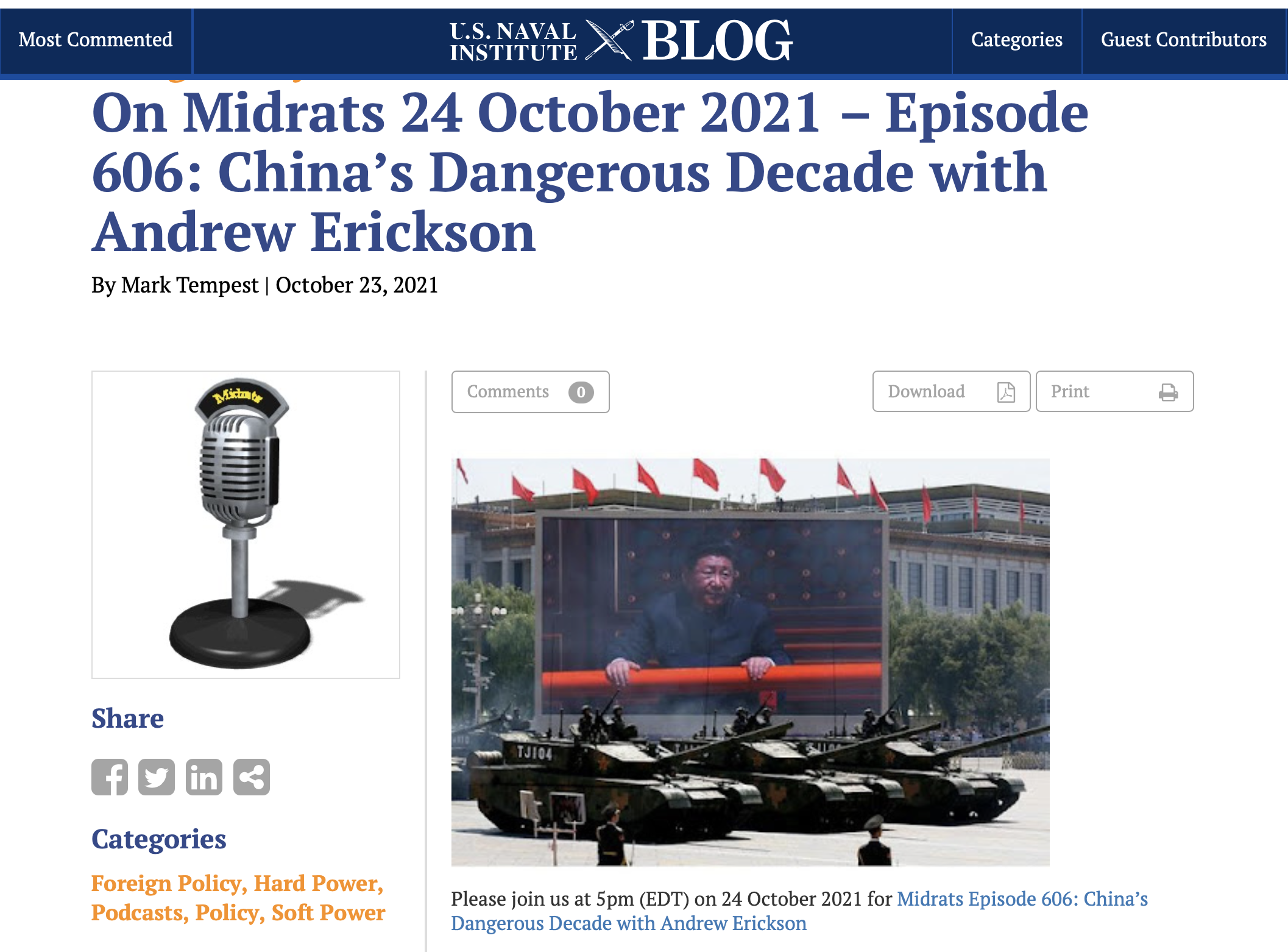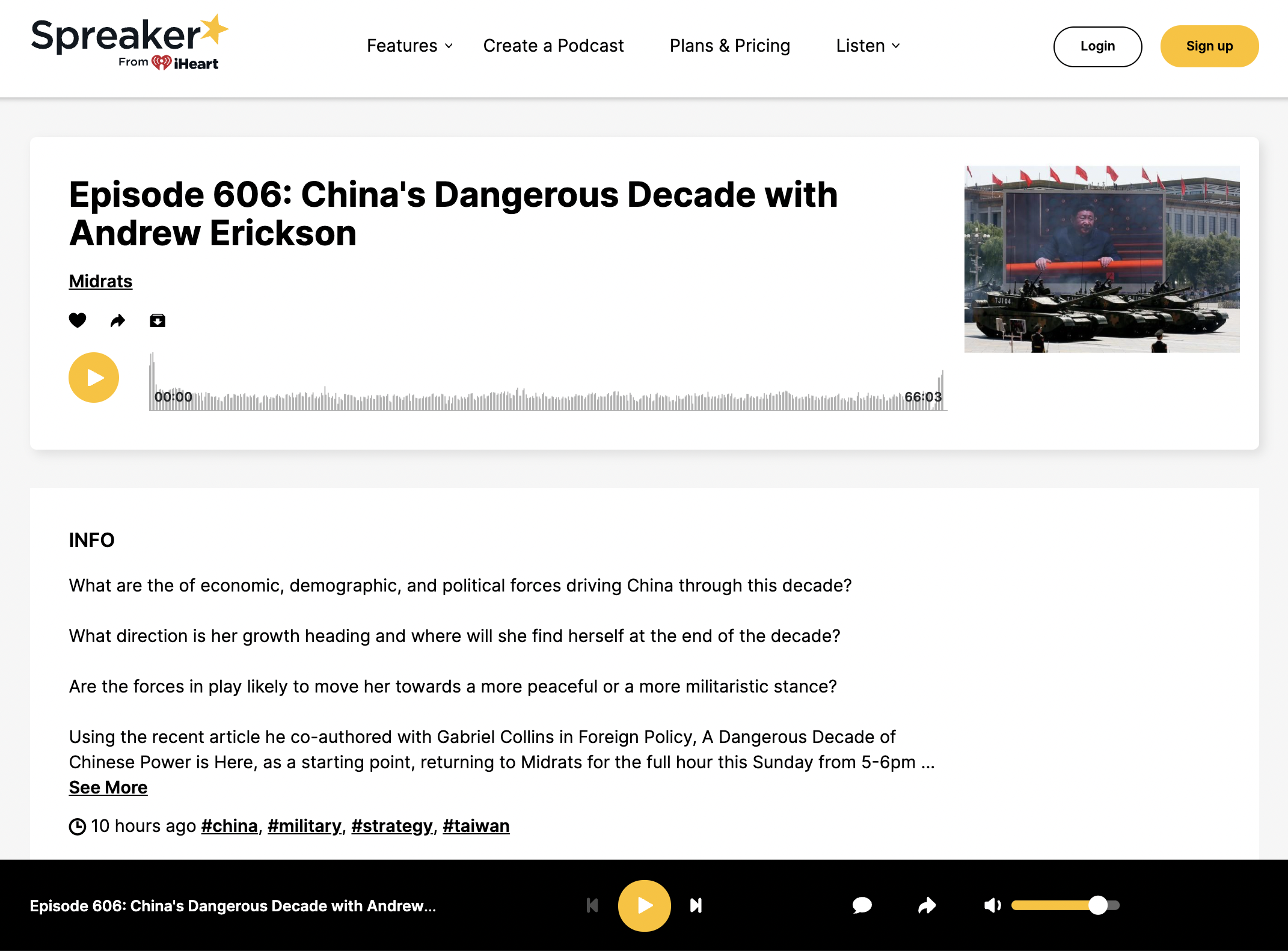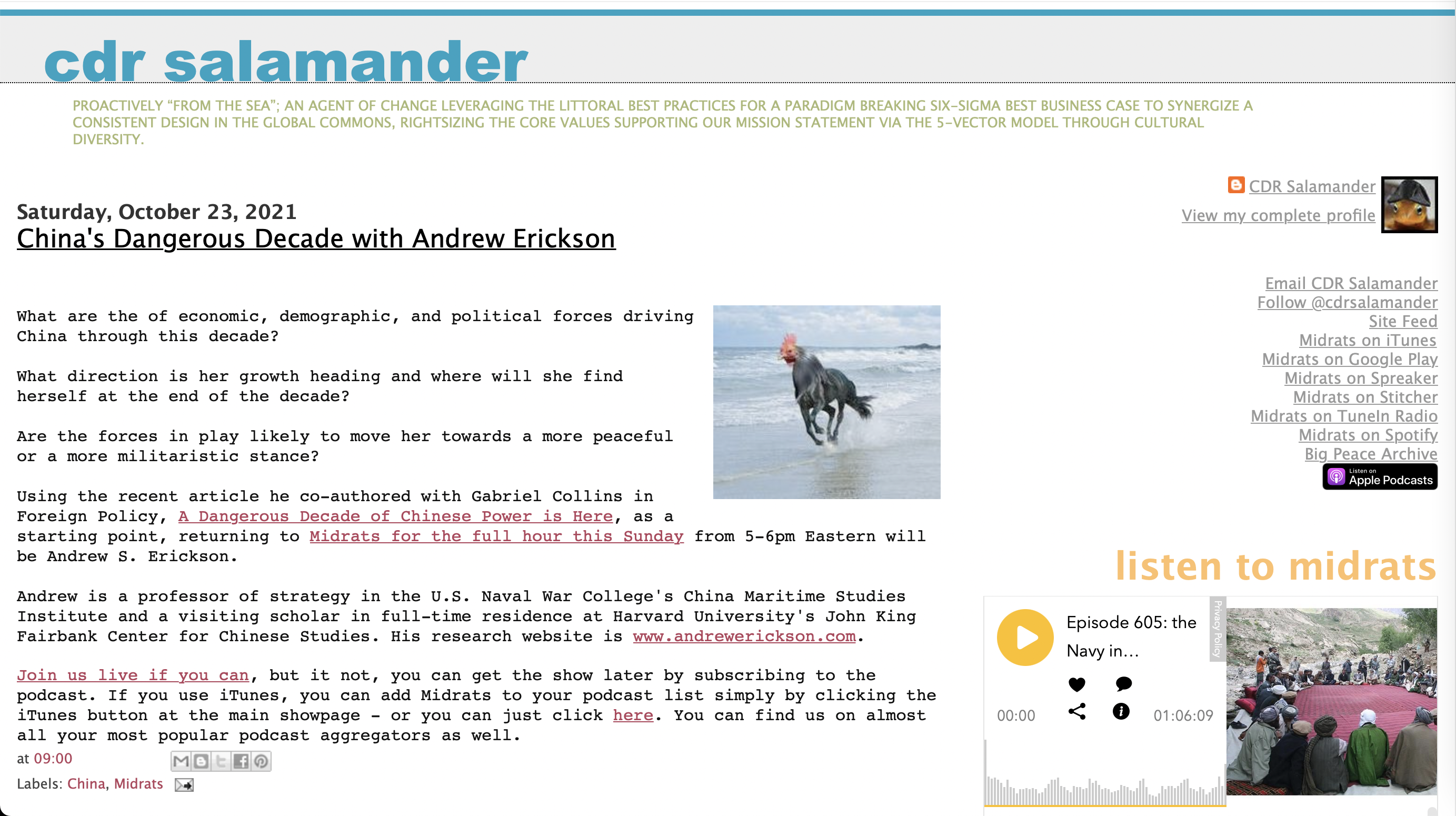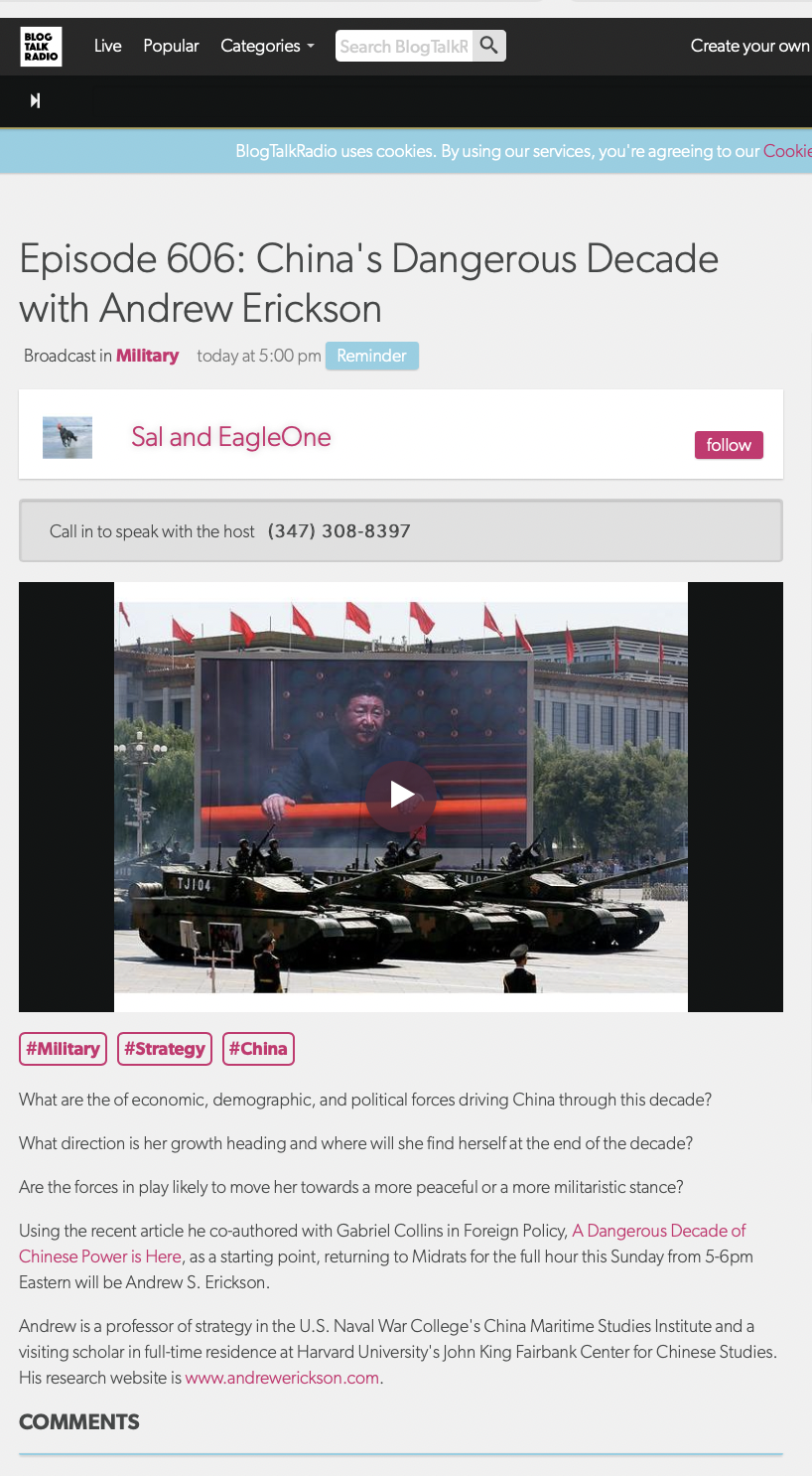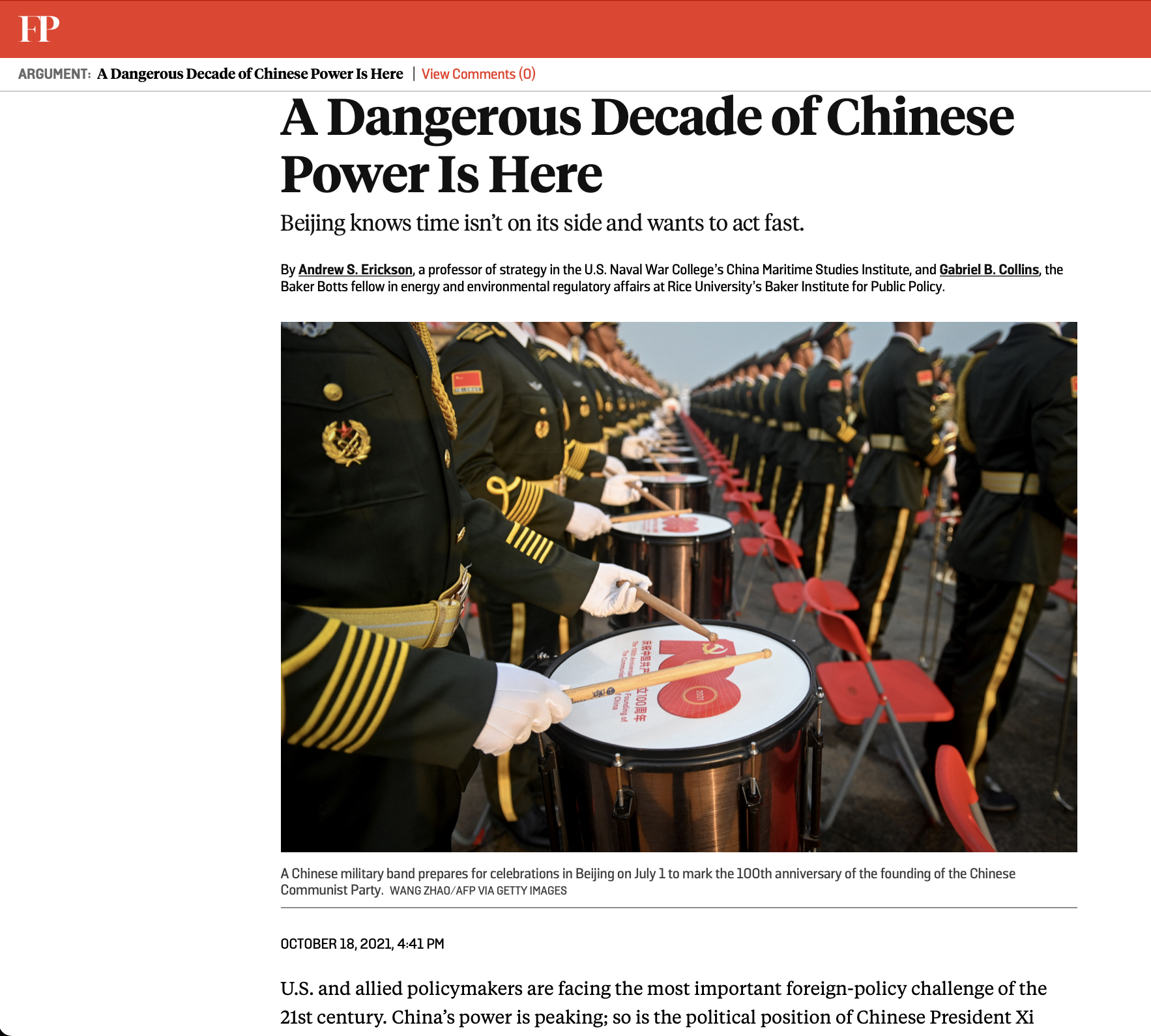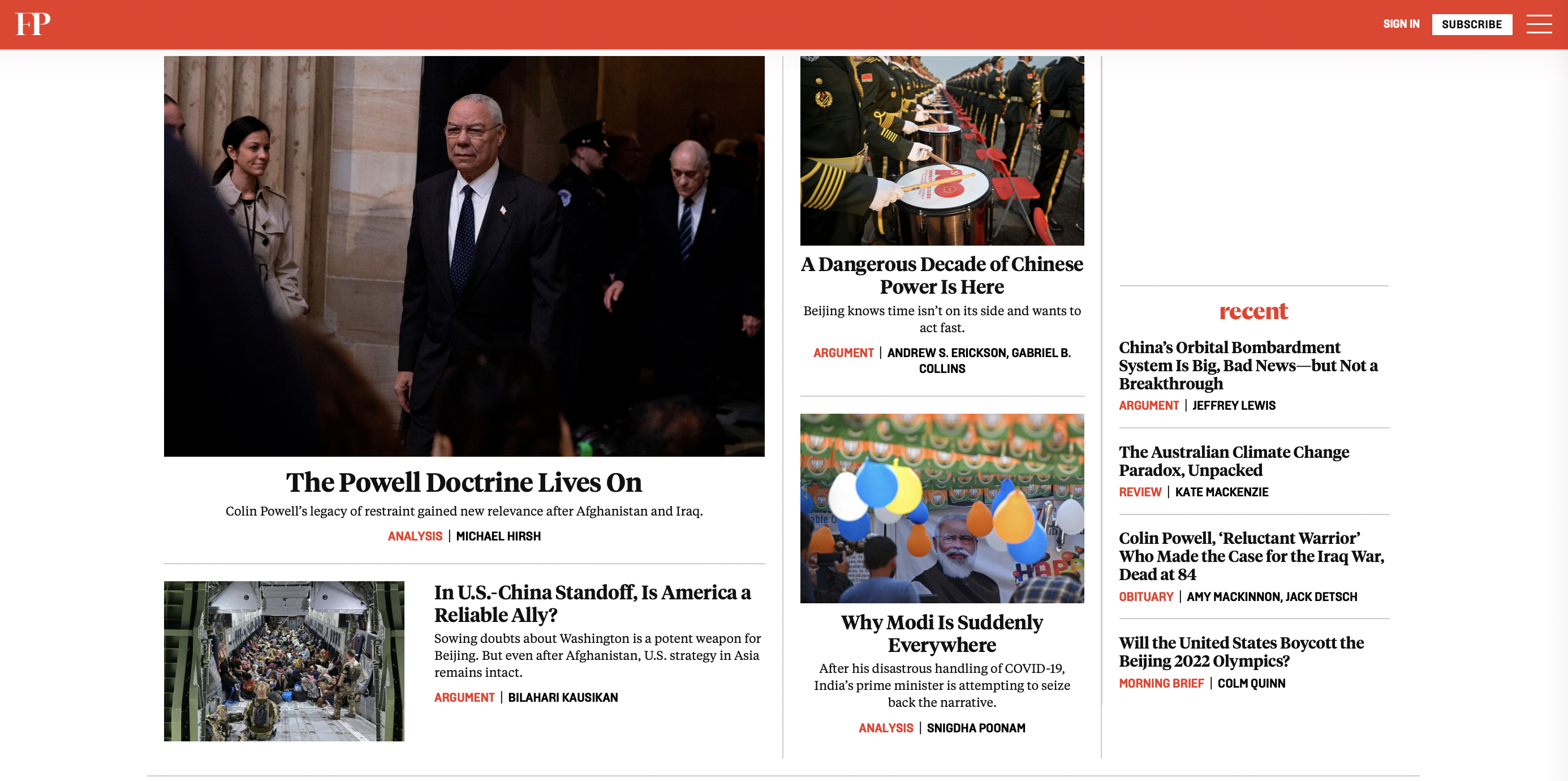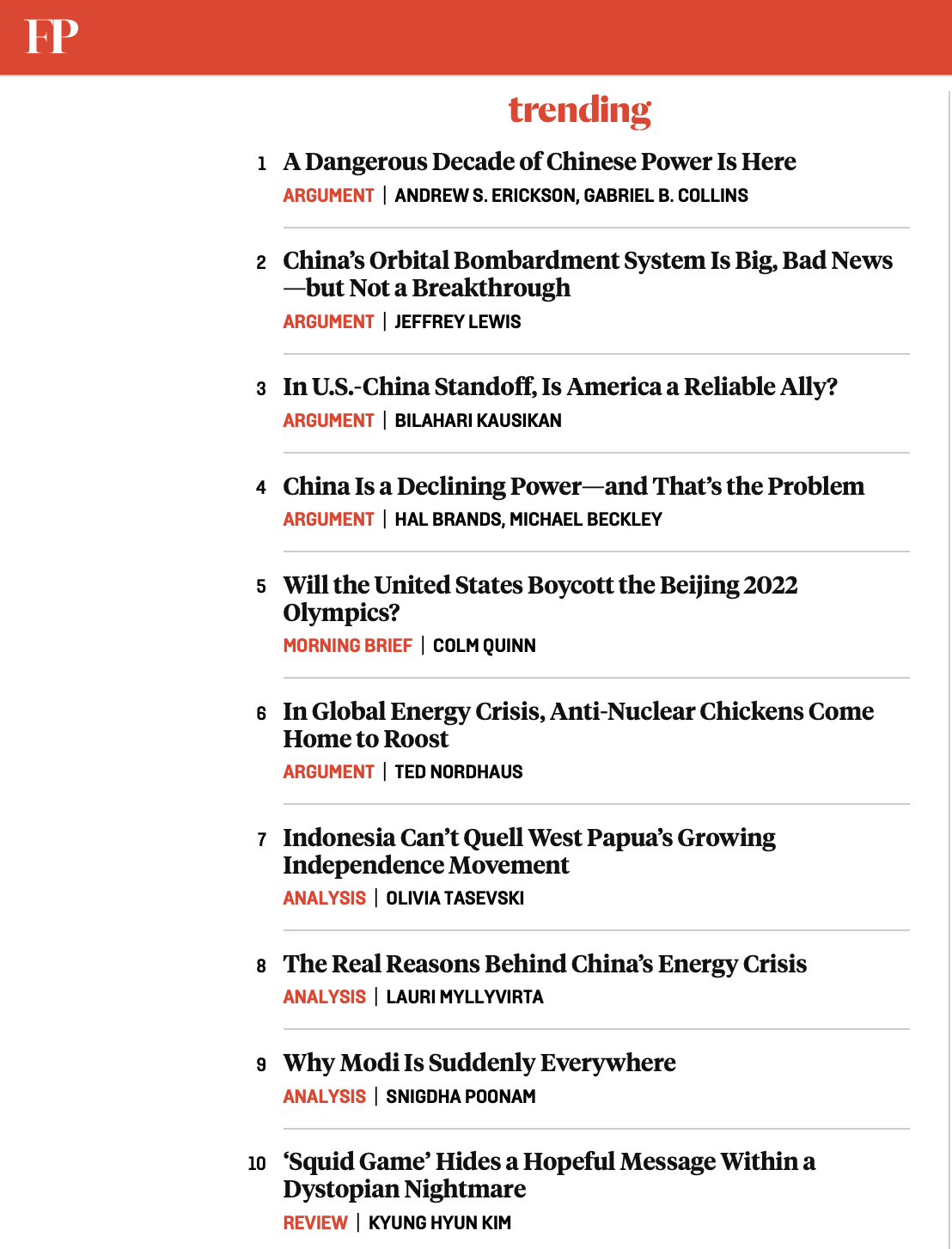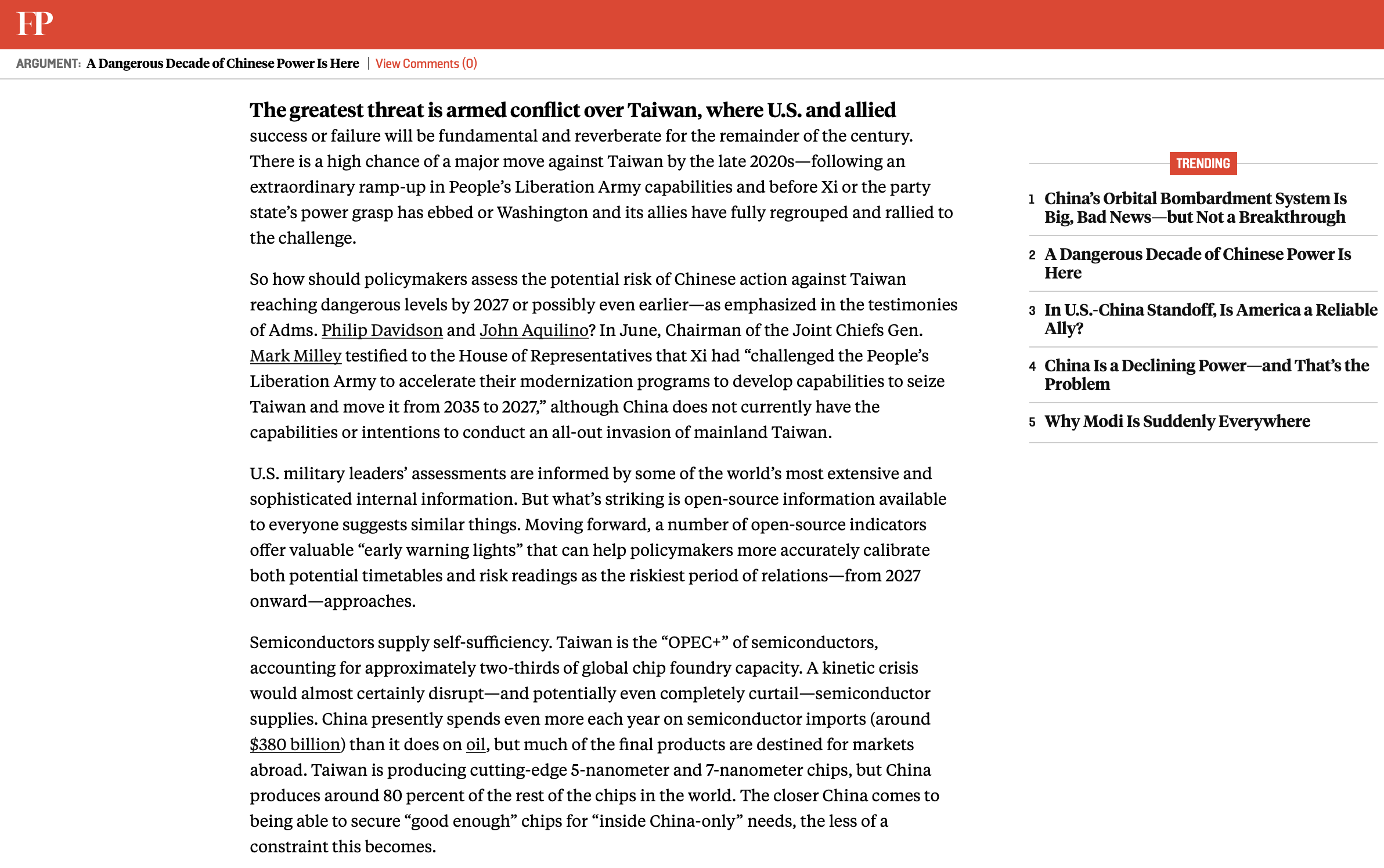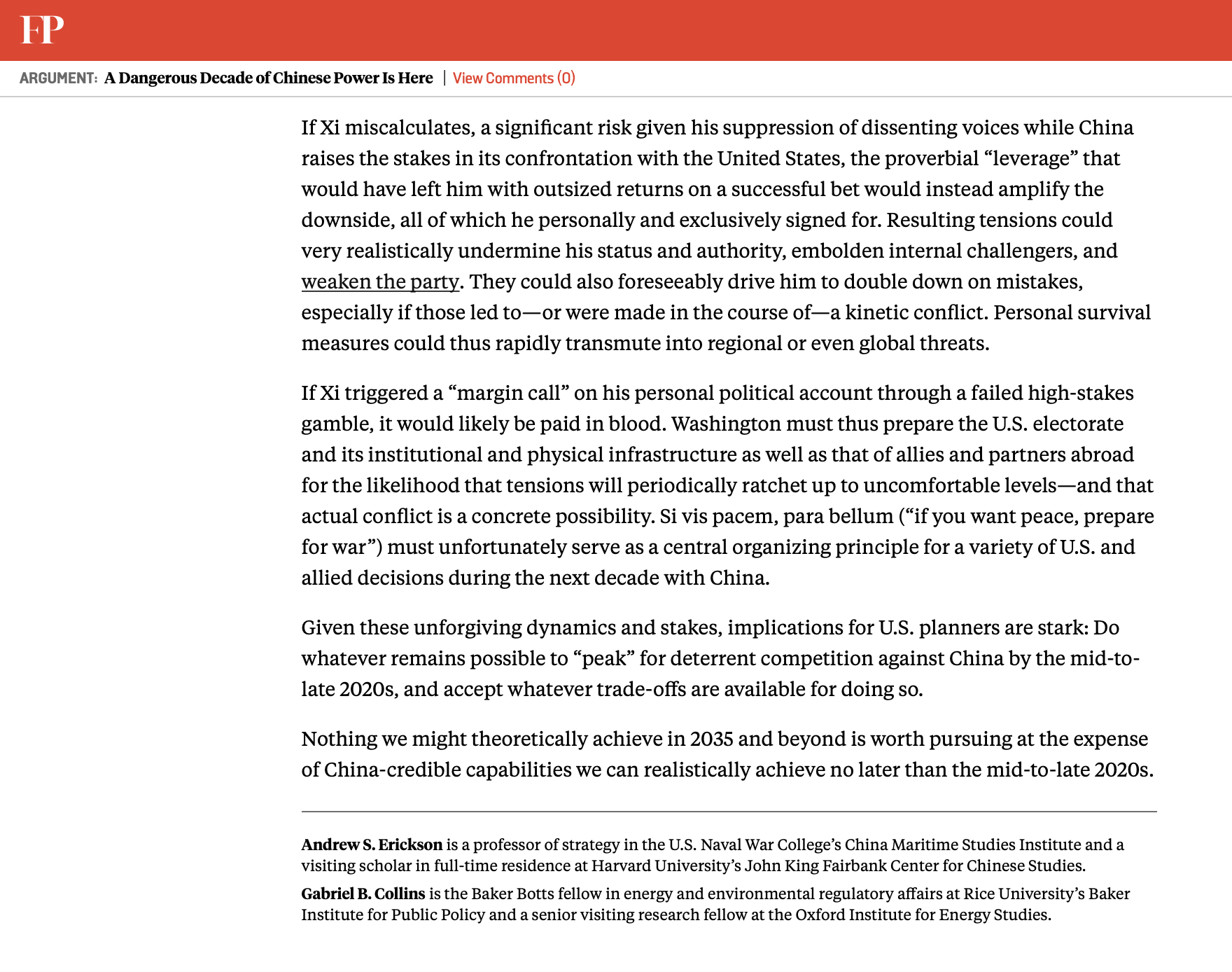Listen to New Midrats Podcast—“Episode 606: China’s Dangerous Decade with Andrew Erickson”
Honored to speak with the hosts CDR Salamander and EagleOne, and all participating in our discussion!
We spoke live at 5 P.M. (EDT) on 24 October 2021 for Midrats Episode 606: China’s Dangerous Decade with Andrew Erickson…
Click here to listen to the 66-minute podcast!
- What are the of economic, demographic, and political forces driving China through this decade?
- What direction is her growth heading and where will she find herself at the end of the decade?
- Are the forces in play likely to move her towards a more peaceful or a more militaristic stance?
- Using the recent article he co-authored with Gabriel Collins in Foreign Policy, A Dangerous Decade of Chinese Power is Here, as a starting point, returning to Midrats for the full hour this Sunday from 5-6pm Eastern will be Andrew S. Erickson.
- Andrew is a professor of strategy in the U.S. Naval War College’s China Maritime Studies Institute and a visiting scholar in full-time residence at Harvard University’s John King Fairbank Center for Chinese Studies. His research website is www.andrewerickson.com.
On MIDRATS, Navy Milbloggers Sal from “CDR Salamander” and EagleOne from “EagleSpeak” discuss leading issues and developments for the Navy, Marine Corps, Coast Guard, and related national security issues.
Join us live if you can, but it not, you can get the show later by subscribing to the podcast. If you use iTunes, you can add Midrats to your podcast list simply by clicking the iTunes button at the main showpage – or you can just click here. You can find us on almost all your most popular podcast aggregators as well.
If you use Apple Podcasts, and miss the show live, you can pick up this episode and others and add Midrats to your podcast list simply by going here. Or on Spreaker. Or on Spotify.
DETAILS ON ARTICLE MENTIONED:
Andrew S. Erickson and Gabriel B. Collins, “A Dangerous Decade of Chinese Power Is Here,” Foreign Policy, 18 October 2021.
China’s Power is Peaking—As is the Danger for the United States
Beijing knows time isn’t on its side and wants to act fast.
U.S. and allied policymakers are facing the most important foreign-policy challenge of the 21st century. China’s power is peaking; so is the political position of Chinese President Xi Jinping and the Chinese Communist Party’s (CCP) domestic strength. In the long term, China’s likely decline after this peak is a good thing. But right now, it creates a decade of danger from a system that increasingly realizes it only has a short time to fulfill some of its most critical, long-held goals.
Within the next five years, China’s leaders are likely to conclude that its deteriorating demographic profile, structural economic problems, and technological estrangement from global innovation centers are eroding its leverage to annex Taiwan and achieve other major strategic objectives. As Xi internalizes these challenges, his foreign policy is likely to become even more accepting of risk, feeding on his nearly decadelong track record of successful revisionist action against the rules-based order. Notable examples include China occupying and militarizing sub-tidal features in the South China Sea, ramping up air and maritime incursions against Japan and Taiwan, pushing border challenges against India, occupying Bhutanese and Tibetan lands, perpetrating crimes against humanity in Xinjiang, and coercively enveloping Hong Kong.
The relatively low-hanging fruit is plucked, but Beijing is emboldened to grasp the biggest single revisionist prize: Taiwan.
Beijing’s actions over the last decade have triggered backlash, such as with the so-called AUKUS deal, but concrete constraints on China’s strategic freedom of action may not fully manifest until after 2030. It’s remarkable and dangerous that China has paid few costs for its actions over the last 10 years, even as its military capacities have rapidly grown.
Beijing will likely conclude that under current diplomatic, economic, and force postures for both “gray zone” and high-end scenarios, the 2021 to late 2020s timeframe still favors China—and is attractive for its 68-year-old leader, who seeks a historical achievement at the zenith of his career.
U.S. planners must mobilize resources, effort, and risk acceptance to maximize power and thereby deter Chinese aggression in the coming decade—literally starting now—and innovatively employ assets that currently exist or can be operationally assembled and scaled within the next several years. That will be the first step to pushing back against China during the 2020s—a decade of danger—before what will likely be a waning of Chinese power.
As Beijing aggressively seeks to undermine the international order and promotes a narrative of inevitable Chinese strategic domination in Asia and beyond, it creates a dangerous contradiction between its goals and its medium-term capacity to achieve them. China is, in fact, likely nearing the apogee of its relative power; and by 2030 to 2035, it will cross a tipping point from which it may never recover strategically. Growing headwinds constraining Chinese growth, while not publicly acknowledged by Beijing, help explain Xi’s high and apparently increasing risk tolerance. Beijing’s window of strategic opportunity is sliding shut. … … …
Only the most formidable, agile American and allied deterrence can kick the can down the road long enough for China’s slowdown to shut the window of vulnerability. Holding the line is likely to require frequent and sustained proactive enforcement actions to disincentivize full-frontal Chinese assaults on the rules-based order in the Indo-Pacific. Chinese probing behavior and provocations must be met with a range of symmetric and asymmetric responses that impose real costs, such as publishing assets owned by Chinese officials abroad, cyber interference with China’s technological social control apparatus, “hands on” U.S. Navy and Coast Guard enforcement measures against Maritime Militia-affiliated vessels in the South China Sea, intensified air and maritime surveillance of Chinese naval bases, and visas and resettlement options to Hong Kongers, Uyghurs, and other threatened Chinese citizens—including CCP officials (and their families) who seek to defect and/or leave China. U.S. policymakers must make crystal clear to their Chinese counterparts that the engagement-above-all policies that dominated much of the past 25 years are over and the risks and costs of ongoing—and future—adventurism will fall heaviest on China.
Bombastic Chinese reactions to emerging cohesive actions verify the approach’s effectiveness and potential for halting—and perhaps even reversing—the revisionist tide China has unleashed across the Asian region. Consider the recent nuclear submarine deal among Australia, the United States, and the United Kingdom. Beijing’s strong public reaction (including toleration of nuclear threats made by the state-affiliated Global Times) highlights the gap between its global information war touting China’s irresistible power and deeply insecure internal self-perception. Eight nuclear submarines will ultimately represent formidable military capacity, but for a bona fide superpower that believes in its own capabilities, they would not be a game-changer. Consider the U.S.-NATO reaction to the Soviet Union’s commissioning of eight Oscar I/II-class cruise missile subs during the late Cold War. These formidable boats each carried 24 SS-N-19 Granit missiles specifically designed to kill U.S. carrier battle groups, yet NATO never stooped to public threats.
With diplomatic proofs of concepts like the so-called AUKUS deal, the Quadrilateral Security Dialogue, and hard security actions like the Pacific Deterrence Initiative now falling into place, it is time to comprehensively peak the non-authoritarian world’s protective action to hold the line in the Indo-Pacific. During this decade, U.S. policymakers must understand that under Xi’s strongman rule, personal political survival will dictate Chinese behavior. Xi’s recreation of a “one-man” system is a one-way, high-leverage bet that decisions he drives will succeed.
If Xi miscalculates, a significant risk given his suppression of dissenting voices while China raises the stakes in its confrontation with the United States, the proverbial “leverage” that would have left him with outsized returns on a successful bet would instead amplify the downside, all of which he personally and exclusively signed for. Resulting tensions could very realistically undermine his status and authority, embolden internal challengers, and weaken the party. They could also foreseeably drive him to double down on mistakes, especially if those led to—or were made in the course of—a kinetic conflict. Personal survival measures could thus rapidly transmute into regional or even global threats.
If Xi triggered a “margin call” on his personal political account through a failed high-stakes gamble, it would likely be paid in blood. Washington must thus prepare the U.S. electorate and its institutional and physical infrastructure as well as that of allies and partners abroad for the likelihood that tensions will periodically ratchet up to uncomfortable levels—and that actual conflict is a concrete possibility. Si vis pacem, para bellum (“if you want peace, prepare for war”) must unfortunately serve as a central organizing principle for a variety of U.S. and allied decisions during the next decade with China.
Given these unforgiving dynamics and stakes, implications for U.S. planners are stark: Do whatever remains possible to “peak” for deterrent competition against China by the mid-to-late 2020s, and accept whatever trade-offs are available for doing so.
Nothing we might theoretically achieve in 2035 and beyond is worth pursuing at the expense of China-credible capabilities we can realistically achieve no later than the mid-to-late 2020s.
Andrew S. Erickson is a professor of strategy in the U.S. Naval War College’s China Maritime Studies Institute and a visiting scholar in full-time residence at Harvard University’s John King Fairbank Center for Chinese Studies.
Gabriel B. Collins is the Baker Botts fellow in energy and environmental regulatory affairs at Rice University’s Baker Institute for Public Policy and a senior visiting research fellow at the Oxford Institute for Energy Studies.

